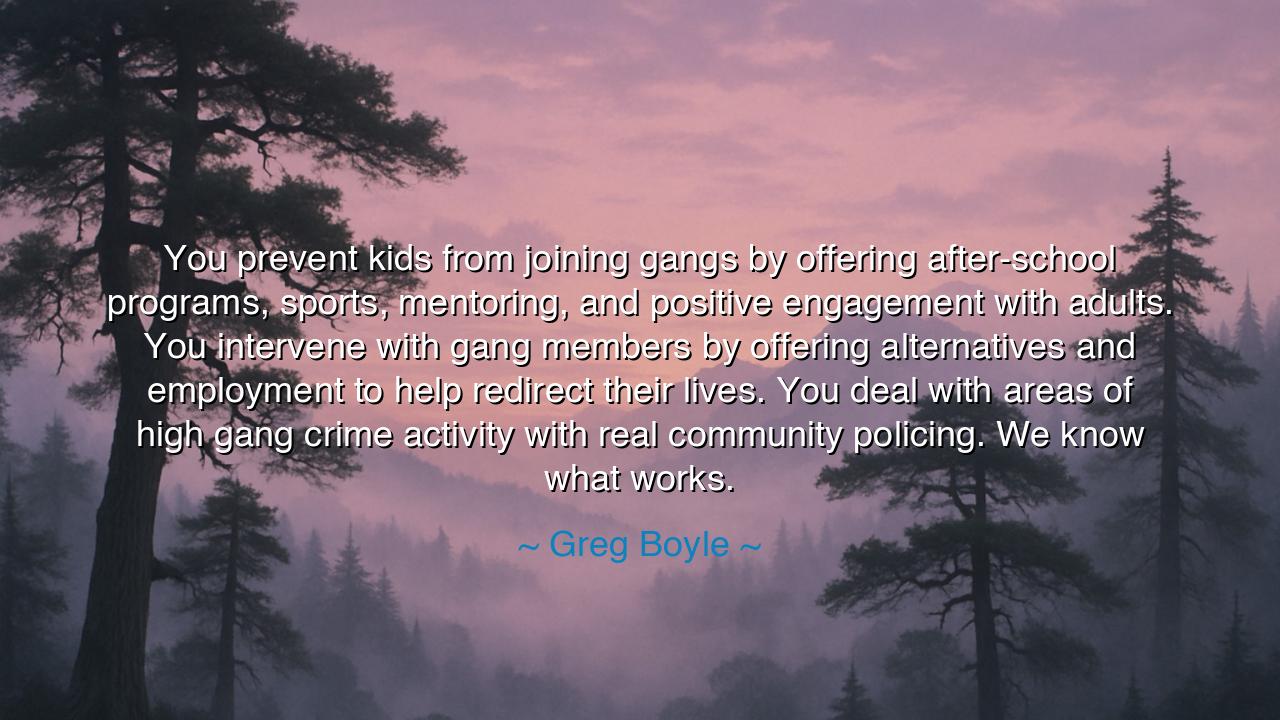
You prevent kids from joining gangs by offering after-school
You prevent kids from joining gangs by offering after-school programs, sports, mentoring, and positive engagement with adults. You intervene with gang members by offering alternatives and employment to help redirect their lives. You deal with areas of high gang crime activity with real community policing. We know what works.






Greg Boyle, the Jesuit priest who has spent his life among those society has cast aside, declared with conviction: “You prevent kids from joining gangs by offering after-school programs, sports, mentoring, and positive engagement with adults. You intervene with gang members by offering alternatives and employment to help redirect their lives. You deal with areas of high gang crime activity with real community policing. We know what works.” These words are not abstract philosophy, nor political rhetoric—they are the fruit of a life lived in the trenches of suffering and redemption. They speak to the eternal truth that evil is not overcome by punishment alone, but by the creation of alternatives that give light where there was once only darkness.
When Boyle says “we know what works,” he speaks with the authority of one who has walked the alleys where children have chosen death over hope. He knows that no soul is born to be a gangster; each child is born with a heart ready to be loved, a mind ready to be shaped, and hands ready to build. Yet when society offers no programs, no mentors, no places of belonging, gangs rush in to fill the void. Thus, the true battlefield is not the courtroom nor the prison, but the playground, the classroom, the after-school program where a child discovers he has value beyond violence.
The ancients knew this as well. In Athens, the youth were not left to wander idly in the streets, for the city provided gymnasiums and schools where they could learn philosophy, mathematics, and sports—not only to strengthen their bodies, but to channel their restless energy into discipline. The Spartans, though harsh, understood that young men needed structure and purpose, lest chaos consume them. Boyle’s wisdom is the same: give the young structure, opportunity, and belonging, and they will not seek it in the embrace of gangs.
History offers us stories of transformation through this path. Consider the tale of Nicky Cruz, once a violent gang leader in New York City. When all the world feared him, a preacher approached him not with condemnation, but with love and a belief that his life could be redirected. Nicky found a new path, leaving behind destruction to become a man who himself reached out to youth. This story mirrors Boyle’s conviction that the heart of intervention is not punishment, but alternatives and employment, ways to redirect the fire of young men and women toward life rather than death.
The emotional weight of Boyle’s words comes from his refusal to surrender to despair. Where others see “problems,” he sees potential. Where others cry for harsher laws, he calls for real community policing—police who know the names of the children, who walk the neighborhoods not as conquerors but as guardians. His vision is not of a society divided by fear, but of one united by compassion and wisdom. He does not dream idly; he testifies from decades of proof: “We know what works.”
For the seeker of wisdom, the lesson is luminous: evil cannot be driven out by hatred alone, but by creating a greater good that draws the soul away from destruction. To save a child from gangs, give them mentors who believe in them. To redeem the fallen, give them work and dignity. To heal communities, give them officers who are neighbors, not strangers. This is not softness—it is the hardest, most heroic path, for it demands faith in the possibility of change, even when all evidence says otherwise.
What then must we do? Support the programs that mentor the young. Give your time to coach, to teach, to listen. Provide opportunities for work to those who seek a second chance. Advocate for policing that is rooted not in fear, but in trust. And above all, never allow yourself to believe that any life is beyond redemption. For every child who chooses a gang is really choosing belonging; give them a better belonging, and you give them back their future.
Thus Greg Boyle’s words ring as a command for our time: “We know what works.” The path is clear, though it requires courage and compassion. To build a world without gangs is not to curse the darkness, but to light fires of hope—in schools, in parks, in workplaces, in communities. And when we do this, we do not merely save individuals—we redeem generations, and we prove that love, when made practical and disciplined, is the most powerful force in the world.






AAdministratorAdministrator
Welcome, honored guests. Please leave a comment, we will respond soon